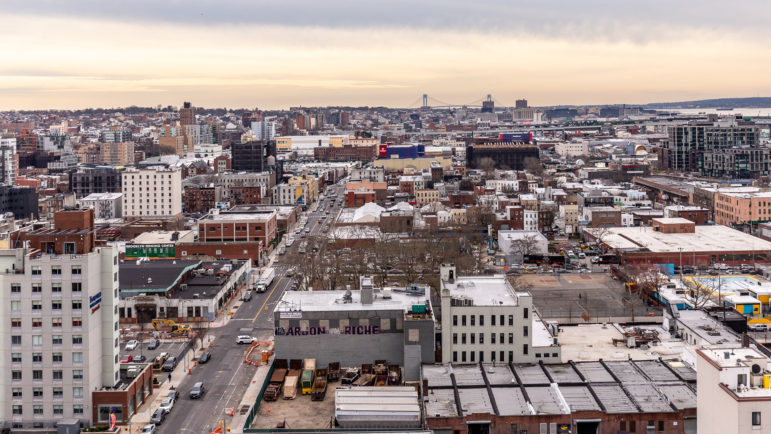Whoever wins the presidency could have a huge impact on housing in New York City, from homelessness to homeownership, and private development to public housing.

Adi Talwar
Looking South down 3rd Avenue from NYCHA Wickoff Gardens in Brooklyn.The need to increase access to affordable housing is not a new issue for New York City—but the pandemic has intensified its consequences, and highlighted other persistent inequities in New Yorkers’ access to stable housing.
As City Limits reported last week, housing analysts expect that the fallout from widespread unemployment and underemployment during the ongoing public health crisis will have ripple effects on access to stable, affordable housing for a long time to come. By the start of 2021 when the next president will take office, New York State could see between 800,000 to 1.23 million households across the state unable to pay rent and at risk for eviction, 730,000 eviction filings and between $2.5 to $3.4 billion in rent debt, one report estimated.
While the federal government is always a crucial player in city housing issues, the presidential election in November will be particularly impactful this time around, experts said during “The Home Stretch: Donald Trump, Joe Biden and New York’s Housing Crunch,” a virtual discussion City Limits hosted Thursday. The panelists were Victor Bach of Community Service Society, Matthew Dunbar of Habitat for Humanity NYC, Marquis Jenkins of West Harlem Environmental Action (WeACT) and Barika Wiliams of the Association for Neighborhood and Housing Development (ANHD).
Watch the full discussion from Thursday’s event below.
The stakes are high during this historic pandemic and associated economic downturn, and the differences between Donald Trump and Joe Biden’s housing policy platforms are significant in a number of ways—from the willingness to fund more ambitious solutions to tackle affordability to the way that housing discrimination is dealt with.
Williams, of ANHD, said she’s glad to see housing getting more attention as an issue this election cycle. She says that while it might be difficult for Biden to get some of his more ambitious policy proposals through Congress, such as a plan to use housing vouchers to correct disparities in the tax code that benefit homeowners more than renters, there’s reason to be hopeful. Big changes have historically come to fruition when there’s an economic crisis, Williams noted, which can increase the appetite in Congress for greater spending to address the scale of need across the country.
Additionally, Biden seems to be framing housing within a set of policies to increase infrastructure spending and invest in economic recovery, which could increase the potential success of those policy proposals becoming law if he’s elected.
The panelists also discussed the substantial impact the Trump administration has had on housing since it rolled back rules against racial discrimination. Dunbar, of Habitat for Humanity, underscored that “this kind of discrimination is not a thing of the past.” He pointed to the need for more enforcement, something the federal government has moved away from under Trump.
Jenkins of WEACT noted that the pandemic has also made clear the dangers of not addressing concerns that public housing residents have been raising for years about poor ventilation, mold, and pests. Public housing issues are consequential not just for its residents but for the role they play in the surrounding neighborhood, and because many of the workers who’ve kept the city going by working through the pandemic live in public housing—When they get sick, he said, it affects all New Yorkers.
No matter who wins the election, tenants and advocates will continue to hold Democratic and Republican leaders accountable for housing issues, Thursday’s panelists said.
“What I am seeing is the voices of public housing residents getting louder and louder as this problem is becoming more and more intense,” Jenkins said. “My advice to all of you is to keep fighting because they are hearing us, and change is coming.”
Nicole Javorsky is a Report for America corps member.









One thought on “VIDEO: How the Election Will Impact NYC Housing”
More of a local issue. NYC needs to encourage home ownership and eliminate rental regulations on 1,2 and 3 family homes. Private homes are not the same as apartment buildings. Environmental regulations like the ‘green roof’ rule only raise the price of new home construction in NYC.